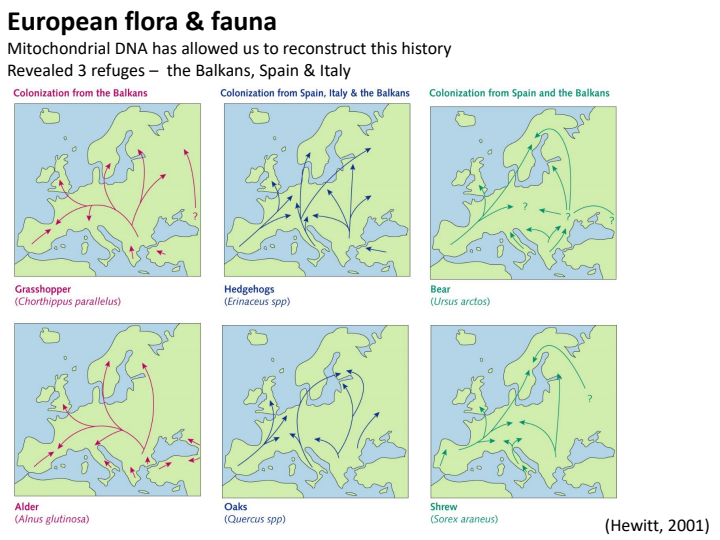Comparative methods 2022 (copy)
1/7
There's no tags or description
Looks like no tags are added yet.
Name | Mastery | Learn | Test | Matching | Spaced | Call with Kai |
|---|
No analytics yet
Send a link to your students to track their progress
8 Terms
Comparative Methods- What can we do with a phylogenetic tree?
1.Trees, Maps and Time
•Place the tree on a map & see how history correlates with geography
2.Trees and Traits
•Place traits on the tree to understand the history of a particular trait
3.Trees, Traits and Maps
•Do both 1 & 2 to see how the history of a trait correlates with geography
4.Independent Contrasts
•Place two traits on the tree and use the structure of the tree to remove history from their correlation
1-Trees, Maps and Time
Combining phylogenetics with geology and geography provides powerful insights into history.
During the Pleistocene, glaciers covered large areas of Europe
Plants & animals could only survive in south
As glaciers melted they moved north (12,000yrs ago)
European flora & fauna
Mitochondrial DNA has allowed us to reconstruct this history
Revealed 3 refuges– the Balkans, Spain & Italy

2-Trees and Traits
Reconstructing the history of trait evolution can overturn received opinion
E.g. Parasitic Hymenoptera
Important crop pests can be ectoparasitic or endoparasitic
We used to think that ectoparasitism evolved first in this group, but phylogenies suggest that endoparasitism is the ancestral state, and ectoparasitism is derived. Even though in some groups the trait was reversed again
3-Trees, Traits and Maps
E.g. Caribbean anoles Different islands each have specialized ‘ecomorphs’
History + geography, informed by phylogenetics, sheds light on community assembly
Ecomorph- A morphology associated with a particular ecological habit
Two possible scenarios:
1-Lizards speciated& radiated on one island, and then these species( ecomorphs) spread to other islands
2- Speciation & radiation happened independently on every island
Ecomorph
A morphology associated with a particular ecological habit
4-Independent contrasts
4-Independent contrasts
•Anolis ecomorphs evolved many times. However, if it had happened only once we wouldn’t know if this was just chance, or had a evolutionary cause.
•Species are not independent samples
•Number of species with a particular trait does not equal the number of times it evolved, as some may be closely related.
•Shared histories at variable depths in time introduces special problems for statistical analysis of comparative patterns
Summary
•Phylogenies can confirm or refute existing ideas about evolution
•All comparisons must begin with a reliable phylogeny
•Species are not independent samples
•Even the best comparisons only SUGGEST causes– cannot reveal for certain
•Historical component is a combination of adaptation and constraint